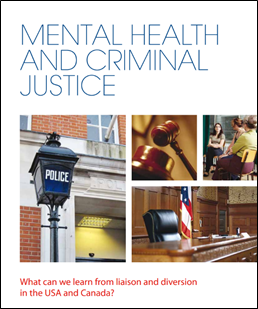In September 2013, Paula Reid, a researcher from the United Kingdom paid a visit to CMHA Ontario to discuss the intersection of criminal justice and mental health and how to better support individuals with mental health issues who have come into contact with the law.  The result of this work is now published in a report titled “Mental Health and Criminal Justice – What can we learn from liaison and diversion in the USA and Canada?” The report discusses intercepts in the justice system or juncture points similar to the ones found in the CMHA Ontario Adult Criminal Justice and Metal Health Systems Map and outlines different strategies and best practices at each point. Many of these best practices highlight CMHA’s work in promoting a cross-sectoral approach to coordinate supports for individuals with mental health conditions who come into contact with the justice system.
The result of this work is now published in a report titled “Mental Health and Criminal Justice – What can we learn from liaison and diversion in the USA and Canada?” The report discusses intercepts in the justice system or juncture points similar to the ones found in the CMHA Ontario Adult Criminal Justice and Metal Health Systems Map and outlines different strategies and best practices at each point. Many of these best practices highlight CMHA’s work in promoting a cross-sectoral approach to coordinate supports for individuals with mental health conditions who come into contact with the justice system.
The Human Services and Justice Coordinating Committee (HSJCC) Network, a partner of CMHA Ontario, is profiled as a good way to engage in community-problem solving at the local level in order standardise processes and develop common language between sectors who serve vulnerable individuals who have come into contact with the law. The report hopes that the newly proposed ‘Local Crisis Declarations’ as part of the Crisis Concordat in January 2014 will foster similar collaboration across the UK. The report also profiled the Police-Emergency Department protocol used in Hamilton to effectively transfer individuals apprehended under the Mental Health Act into the appropriate services. For more on Police-ED Protocols in Ontario, read the HSJCC Info Guide on this topic. The Info Guide will also be presented at the upcoming CMHA National Conference in October. At the local level, the report highlighted the Mental Health and Justice beds or safe beds provided by CMHA Toronto Branch. This type of diversions is an alternative to individuals being admitted to hospital and can also be used once an individual is released from custody as a transition point into living independently. Finally, the report makes 9 recommendations including:
- mapping pathways for people with mental health issues who have come into contact with the law
- ensuring referral process result in appropriate transfer of care
- providing mental health awareness training for police officers
- using the Crisis Intervention Team model to develop better diversion
- creating a steering groups at the local level to oversee all elements of their crisis care system
- having comprehensive datasets on crisis services
- introducing pre-prosecution or pre-sentencing diversion models in mental health court settings
- considering the use of peer support programs in all mental health and crisis services
- developing joint protocols around information-sharing between mental health and crisis services
Some of these recommendations are similar to the one released in the recent Toronto Police Services review and illuminate the need for better coordination and collaboration between the criminal justice and mental health sectors in Canada and abroad. For more information on how these issues and others are being addressed in Ontario, please read the Provincial HSJCC Annual Report.